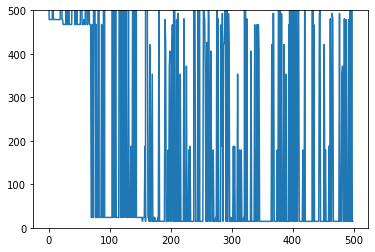Evolving Functions with pg.mutfun¶
PyGlove provides an extension library pg.mutfun for handling low-level mutable functions, which allows searching for an arbitrary function based on predefined instructions. This notebook illustrates how to evolve a function and do symbolic regression based on this extension library.
!pip install pyglove
import pyglove as pg
from pyglove.ext.mutfun import Instruction, Function, Assign, Var, BinaryOperator, Add, Substract, Multiply, Divide
Creating a mutable function and call it¶
f = Function(
'f',
[
Assign('y', 2),
Var('x') + Var('y')
],
args=['x'])
print(f)
f.compile()
print('f(1) =', f(1))
def f(x):
y = 2
return x + y
f(1) = 3
# A bad function can be caught with `Function.compile`.
g = Function(
'g',
[
Var('x') + Var('y')
])
print(g)
try:
g.compile()
except ValueError as e:
print('Compilation failed:', e)
def g():
return x + y
Compilation failed: Undefined variables {'x', 'y'} found at 'body[0]'.
Evolving a mutable function¶
seed = Function('seed', [
Assign('y', Var('x') * 2),
Assign('z', 3 + Var('x')),
Var('y') + Var('z'),
], args=['x'])
print(seed)
print('seed(2) =', seed(2))
def seed(x):
y = x * 2
z = 3 + x
return y + z
seed(2) = 9
import random
def evolve_fn(k, v, p):
if isinstance(v, BinaryOperator):
other_binary_ops = list(Instruction.select_types(
lambda cls: (issubclass(cls, BinaryOperator)
and cls not in (BinaryOperator, v.__class__))))
another_op = random.choice(other_binary_ops)
return another_op(**v.sym_init_args)
elif isinstance(v, Var):
vars = v.seen_vars() - set([v.name, v.parent_func().name])
if vars:
return Var(random.choice(list(vars)))
return v
def evolve_weights(mt, k, v, p):
# Evolving only binary op and var.
if isinstance(v, (BinaryOperator, Var)):
return 1.0
return 0.0
def search():
search_space = pg.evolve(seed, evolve_fn, weights=evolve_weights)
search_algo = pg.evolution.Evolution(
(pg.evolution.selectors.Random(10)
>> pg.evolution.selectors.Top(1)
>> pg.evolution.mutators.Uniform()),
population_init=(pg.geno.Random(), 1),
population_update=pg.evolution.selectors.Last(20))
for example, feedback in pg.sample(
search_space, search_algo, num_examples=5):
print(example)
reward = example(2)
feedback(reward)
print(reward)
search()
def seed(x):
y = x * 2
z = 3 + x
return y + z
9
def seed(x):
y = x * 2
z = 3 + y
return y + z
11
def seed(x):
y = x * 2
z = 3 + y
return x + z
9
def seed(x):
y = x * 2
z = 3 / y
return y + z
4.75
def seed(x):
y = x * 2
z = 3 ** y
return y + z
85
Symbolic regression¶
Create a random program with random chosen BinaryOperators.
def random_program(
max_lines: int = 5, min_lines: int = 1, use_constants=(1, 2)):
num_lines = random.randint(min_lines, max_lines)
instructions = []
binary_ops = list(Instruction.select_types(
lambda cls: issubclass(cls, BinaryOperator) and cls is not BinaryOperator))
def random_operand(max_var_index):
if random.choice([True, False]):
# Use variable.
var_index = random.randint(0, max_var_index)
return Var(f'v{max_var_index}')
else:
return random.choice(use_constants)
def random_op(max_var_index):
return random.choice(list(binary_ops))(
random_operand(max_var_index),
random_operand(max_var_index))
for i, _ in enumerate(range(num_lines)):
ins = Assign(f'v{i + 1}', random_op(i))
instructions.append(ins)
return Function('h', instructions, args=['v0'])
Coding symbolic regression:
from typing import List, Tuple
def symbolic_regress(seed,
truth_fn,
sample_points: List[Tuple[float]],
num_iterations: int = 500):
labels = [truth_fn(*sample_point) for sample_point in sample_points]
search_space = pg.evolve(seed, evolve_fn, weights=evolve_weights)
search_algo = pg.evolution.Evolution(
(pg.evolution.selectors.Random(20)
>> pg.evolution.selectors.Top(1)
>> pg.evolution.mutators.Uniform()),
population_init=(pg.geno.Random(), 1),
population_update=pg.evolution.selectors.Last(100))
losses = []
min_loss, best_example = None, None
for example, feedback in pg.sample(
search_space, search_algo, num_examples=num_iterations):
example.prune()
try:
prediction = [example(*args) for args in sample_points]
loss = sum([(l - p) ** 2 for l, p in zip(labels, prediction)]) / len(labels)
except (ZeroDivisionError, OverflowError):
loss = 1e10
feedback(-loss)
if min_loss is None or min_loss > loss:
min_loss, best_example = loss, example
losses.append(loss)
return (best_example, min_loss, losses)
seed = random_program()
print(seed)
best_example, min_loss, losses = symbolic_regress(
seed,
lambda x: x ** 2 + x,
[(1,), (2,), (-1,), (3,), (5,), (7,), (-3,), (-5,)])
print(best_example, min_loss)
def h(v0):
v1 = v0 + 2
return v2 = 2 // v1
def h(v0):
v1 = v0 ** 2
return v2 = 2 + v1 14.875
def plot(losses):
import matplotlib.pyplot as plt
plt.ylim(top=500)
plt.plot(range(len(losses)), losses)
plot(losses)
